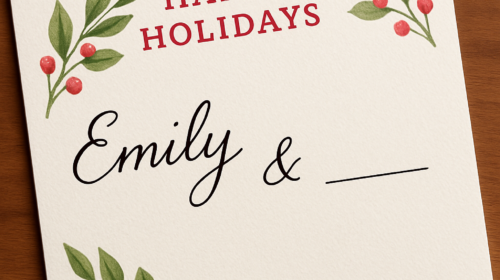Every year, my boyfriend, Nathan, sends out holiday cards to his family and friends. It’s a tradition he’s kept since college—always the same elegant design, a handwritten note, and his personal touch. Last year, since we’d been together for almost two years and living together for six months, I assumed I’d be included. After all, we were building a life together.
That’s why I was stunned when his cards arrived—and my name wasn’t on them.
The Discovery
It started when one of his aunts sent a message to our shared group chat: “Got your beautiful card, Nathan! Wishing you a Merry Christmas too.”
At first, I didn’t think anything of it. But later, when I was tidying the living room, I found one of the extra cards sitting on the coffee table. It was addressed from “Nathan” only. No mention of me.
I opened it, thinking maybe the front was just his name but the note inside included us both. Nope. The inside read: “Wishing you joy and love this holiday season, Nathan.”
The Awkward Question
When he came home that night, I tried to keep my tone casual. “Hey, I saw the holiday cards… how come my name’s not on them?”
He looked surprised, then said, “Oh, I didn’t think about it. I’ve always done them this way.”
I frowned. “But we live together. Don’t you think it makes sense for them to come from both of us?”
Nathan shrugged. “I guess I didn’t want to assume you’d want to be included.”

Why It Stung
It wasn’t about the stationery—it was about what it symbolized. Leaving my name off felt like he was sending a message that our lives weren’t as intertwined as I thought they were. To his friends and extended family, it looked like I wasn’t part of his holiday celebrations at all.
Worse, it made me feel invisible in a tradition that, in my mind, should reflect our partnership. If I’d sent out my own cards without him, I know he would’ve felt left out.
The Conversation We Needed to Have
I told him, “It’s not that I’m desperate to have my name on a card. It’s that it feels like you’re presenting yourself as single—or at least separate from me—to the people who matter to you.”
Nathan insisted that wasn’t his intention. “I’ve just been doing it this way for years. It didn’t occur to me to change it.”
“That’s the point,” I said. “It didn’t even cross your mind. That tells me something about how you see us—or at least how you’re showing us to the world.”
The Family’s Reaction
Things got even more awkward when we visited his parents for Christmas. His mom asked me if I’d gotten my own cards out this year, and when I explained I hadn’t sent any, she said, “Oh, I just assumed you two would do them together.”
Nathan’s face went red. I think that was the first moment he realized other people noticed too.
How We Resolved It
After the holidays, Nathan apologized and admitted he’d been stuck in his old habits without thinking about how our relationship had changed. He said, “Next year, the cards will be from both of us. I promise.”
I appreciated that, but I also told him I needed more than just the promise of a future change. I needed to feel like he was actively including me in the traditions that mattered to him now, not just waiting until next year to fix it.
We ended up brainstorming new holiday traditions we could share, from decorating the tree together to hosting a small dinner party for friends.
What I Learned
The card incident was small on the surface, but it revealed something bigger: the importance of intentionally integrating your partner into your life—not just privately, but publicly too. Relationships aren’t just about shared moments at home; they’re also about how you present yourselves to the world as a couple.
Final Thought: Inclusion in traditions isn’t just about appearances—it’s about acknowledgment. The smallest gestures, like a name on a holiday card, can make someone feel valued and seen, or overlooked and excluded.



